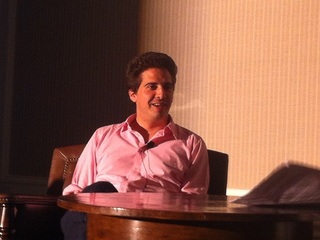Video: Jeffrey Brewer at Vator Splash Health 2017
Building out the artificial pancreas to treat diabetes
Read more...
As many of you probably know, Whisper has recently found itself in some hot water privacy policy, following the bombshell report in the Guardian earlier this month, which accused Whisper of not only tracking its users and collecting user data, but then sharing it with the United States Department of Defense.
The report earned it the ire of a sitting United States Senator, and even caused CEO Michael Heyward to suspend members of the company's editorial staff, including editor-in-chief Neetzan Zimmerman.
The topic of privacy came up when Heyward spoke to Vator founder and CEO Bambi Francisco at Vator Splash LA in early October, and I thought it would be interesting to revist those comments in light of what has happened since then.
The topic actually started with Francisco asking about YourVoice, Whisper's non-profit organization founded in 2012 to give Whisper users struggling with mental illnesses a place to share their voice and give them access to resources in hopes that they seek professional help. She asked what percent of Whisper's users fall into this category and if advertisers were concerned about advertising to this group, or whether this kind of user base attracted certain predatory advertisers.
"It started as a place where our users who were posting sometimes these things that were really sad. Like, young people talking about feeling so stressed at college that they feel like they need to take their own life. We said, 'Ok, we need to create a place where we can put all of the resources into the same place and then direct our users there.' And that's what it started as. And now we've really evolved it into thinking about, how can we attack the issue at its core? Which is that there's stigma around these issues," he said.
"So the whole idea behind YourVoice is, how can we take all of this stuff going on on Whisper, cause we have the data and we see what people are talking about and we even look at it by city and by school. I was talking to someone today that, according to data from Whisper, more students at Cornell cheat on their exams than at any other university in the world. So what's going on at Cornell that kids feel like they have to cheat on their tests all the time?"
Francisco took the opening to inquire as to how, exactly, he knew that information.
"Kids aren't saying, 'I'm from Cornell and I cheat on my tests.' You're compliling that data and publicizing it, and maybe this isn't a good example, but aren't there some examples out there of taking data that's really personal and publicizing it?" she asked. "And how do your users feel about that? Because that's personal data that I'm not sure how much they want it parched out."
When Heyward said that Whisper did not collect any personal identifable information about our users, she asked the next most obvious question: "How did you know they were from Cornell?"
"Their location, but that's not personally idetifiable, that's a shared resource. There's no log in or e-mail address," he said. "There's no user database that has every user's e-mail or every user's username because we don't have usernames, we don't have e-mails, we don't have phone numbers, we don't ask you for it."
But, is tracking them actually compromising their privacy? And would Whisper ever monetize that content, she asked?
Heyward's answer to that was no. In fact, he said, the just published a piece on Buzzfeed that looked at PTSD mentions at the top six military bases in the United States. And they found that Fort Hood, the site of two famous mass shootings. had "significanly more mentions there of PSTD than anywhere else."
"So, I feel very comfortable that working with this data is a very positive thing," Heyward said.
When it comes to tracking, users have the option to turn on geolocation on Whisper, so that the app will know where they are posting from. The Guardian, however, accused the company of tracking its users, even when they had specifically told it not to.
It also said that Heyward had backtracked on how he defined tracking: going from saying that Whisper did not track users, to saying it did not "actively" track them.
Heyward responded to that criticism in a blog post last week.
"We do not track users passively or actively. We have a history of a user’s Whispers, which are public. If they shared their location, it is randomized to within 500m and publicly displayed on their posts," he wrote. "We promote and feature Whispers, and our editorial team looks at past Whispers from a user to determine their authenticity."
For example, if a user potentially claimed to be a doctor treating an Ebola patient in West Africa, but that person never had any Whispers posted in West Africa, "our editorial team would not feature the post."
You can see Francisco's entire interview with Heyward below:
Building out the artificial pancreas to treat diabetes
Read more...The future of care; what will work and what won't?
Read more...The Future of Health & Medicine: Where Can Technology Take Us?
Read more...



